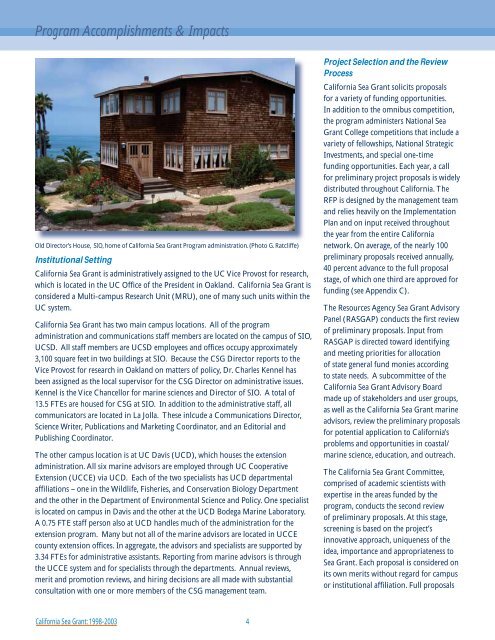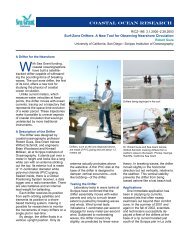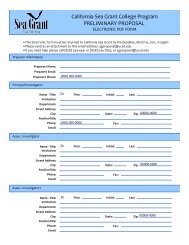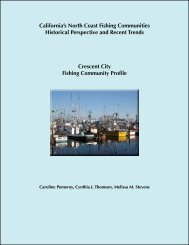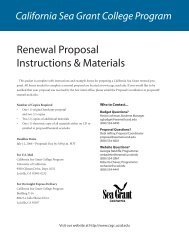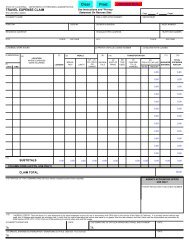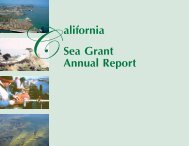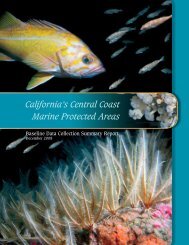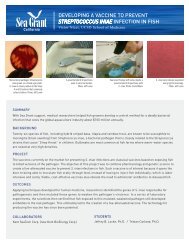PAT-UC Covers - California Sea Grant - UC San Diego
PAT-UC Covers - California Sea Grant - UC San Diego
PAT-UC Covers - California Sea Grant - UC San Diego
Create successful ePaper yourself
Turn your PDF publications into a flip-book with our unique Google optimized e-Paper software.
Program Accomplishments & Impacts<br />
Old Director’s House, SIO, home of <strong>California</strong> <strong>Sea</strong> <strong>Grant</strong> Program administration. (Photo G. Ratcliffe)<br />
Institutional Setting<br />
<strong>California</strong> <strong>Sea</strong> <strong>Grant</strong> is administratively assigned to the <strong>UC</strong> Vice Provost for research,<br />
which is located in the <strong>UC</strong> Office of the President in Oakland. <strong>California</strong> <strong>Sea</strong> <strong>Grant</strong> is<br />
considered a Multi-campus Research Unit (MRU), one of many such units within the<br />
<strong>UC</strong> system.<br />
<strong>California</strong> <strong>Sea</strong> <strong>Grant</strong> has two main campus locations. All of the program<br />
administration and communications staff members are located on the campus of SIO,<br />
<strong>UC</strong>SD. All staff members are <strong>UC</strong>SD employees and offices occupy approximately<br />
3,100 square feet in two buildings at SIO. Because the CSG Director reports to the<br />
Vice Provost for research in Oakland on matters of policy, Dr. Charles Kennel has<br />
been assigned as the local supervisor for the CSG Director on administrative issues.<br />
Kennel is the Vice Chancellor for marine sciences and Director of SIO. A total of<br />
13.5 FTEs are housed for CSG at SIO. In addition to the administrative staff, all<br />
communicators are located in La Jolla. These inlcude a Communications Director,<br />
Science Writer, Publications and Marketing Coordinator, and an Editorial and<br />
Publishing Coordinator.<br />
The other campus location is at <strong>UC</strong> Davis (<strong>UC</strong>D), which houses the extension<br />
administration. All six marine advisors are employed through <strong>UC</strong> Cooperative<br />
Extension (<strong>UC</strong>CE) via <strong>UC</strong>D. Each of the two specialists has <strong>UC</strong>D departmental<br />
affiliations – one in the Wildlife, Fisheries, and Conservation Biology Department<br />
and the other in the Department of Environmental Science and Policy. One specialist<br />
is located on campus in Davis and the other at the <strong>UC</strong>D Bodega Marine Laboratory.<br />
A 0.75 FTE staff person also at <strong>UC</strong>D handles much of the administration for the<br />
extension program. Many but not all of the marine advisors are located in <strong>UC</strong>CE<br />
county extension offices. In aggregate, the advisors and specialists are supported by<br />
3.34 FTEs for administrative assistants. Reporting from marine advisors is through<br />
the <strong>UC</strong>CE system and for specialists through the departments. Annual reviews,<br />
merit and promotion reviews, and hiring decisions are all made with substantial<br />
consultation with one or more members of the CSG management team.<br />
Project Selection and the Review<br />
Process<br />
<strong>California</strong> <strong>Sea</strong> <strong>Grant</strong> solicits proposals<br />
for a variety of funding opportunities.<br />
In addition to the omnibus competition,<br />
the program administers National <strong>Sea</strong><br />
<strong>Grant</strong> College competitions that include a<br />
variety of fellowships, National Strategic<br />
Investments, and special one-time<br />
funding opportunities. Each year, a call<br />
for preliminary project proposals is widely<br />
distributed throughout <strong>California</strong>. The<br />
RFP is designed by the management team<br />
and relies heavily on the Implementation<br />
Plan and on input received throughout<br />
the year from the entire <strong>California</strong><br />
network. On average, of the nearly 100<br />
preliminary proposals received annually,<br />
40 percent advance to the full proposal<br />
stage, of which one third are approved for<br />
funding (see Appendix C).<br />
The Resources Agency <strong>Sea</strong> <strong>Grant</strong> Advisory<br />
Panel (RASGAP) conducts the first review<br />
of preliminary proposals. Input from<br />
RASGAP is directed toward identifying<br />
and meeting priorities for allocation<br />
of state general fund monies according<br />
to state needs. A subcommittee of the<br />
<strong>California</strong> <strong>Sea</strong> <strong>Grant</strong> Advisory Board<br />
made up of stakeholders and user groups,<br />
as well as the <strong>California</strong> <strong>Sea</strong> <strong>Grant</strong> marine<br />
advisors, review the preliminary proposals<br />
for potential application to <strong>California</strong>’s<br />
problems and opportunities in coastal/<br />
marine science, education, and outreach.<br />
The <strong>California</strong> <strong>Sea</strong> <strong>Grant</strong> Committee,<br />
comprised of academic scientists with<br />
expertise in the areas funded by the<br />
program, conducts the second review<br />
of preliminary proposals. At this stage,<br />
screening is based on the project’s<br />
innovative approach, uniqueness of the<br />
idea, importance and appropriateness to<br />
<strong>Sea</strong> <strong>Grant</strong>. Each proposal is considered on<br />
its own merits without regard for campus<br />
or institutional affiliation. Full proposals<br />
<strong>California</strong> <strong>Sea</strong> <strong>Grant</strong>: 1998-2003<br />
4


